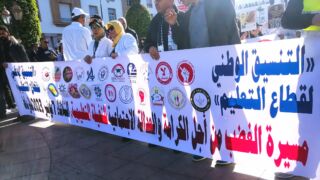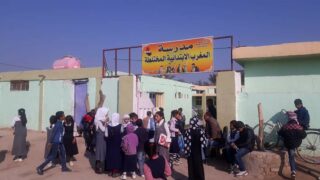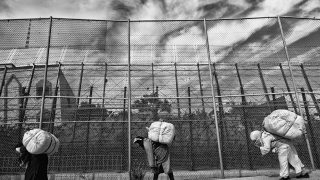Prayers had just ended at Morocco’s largest mosque [in Casablanca] and most of the worshippers had left. A lone sheikh was the only one to stay, before being asked by one of the mosque’s caretakers to leave. The mosque was then closed.
As the sheikh sat in the outer courtyard, he saw foreigners entering the mosque through a side door. When he asked about this, the caretaker said that foreigners paid $30 to visit the Hassan II Mosque, and that he — the sheikh — could enter for free during prayer time.
Mosques are closed between times of prayer. This has been going on in Morocco for years now. Meanwhile, Egypt is witnessing a heated debate after the Ministry of Religious Endowments decided to cancel Friday prayers in specific mosques and impose conditions for itikaf(an Islamic practice involving a period of retreat spent in a mosque). The ministry also stipulated that Friday prayer will only be held in mosques or premises with a surface area exceeding 80 square meters [262 square feet]. Additionally, the ministry annulled the permits of 55,000 imams, which are to be renewed. Therefore, this will subject the imams to short-listing. The ministry will also employ 3,000 imams who graduated from al-Azhar.
The decision raised the ire of Salafists and members of the Muslim Brotherhood, because they will no longer be able to deliver sermons and will have to leave the mosques when prayers end. For his part, Mohamad al-Arefe, a Saudi cleric who issues transborder fatwas, criticized the act of prohibiting scholars, believers and sheikhs from proselytizing and preaching in mosques under the pretext that they are not al-Azhar-qualified.
The religious rhetoric about prayers is no longer enough to justify the decisions. Egypt’s minister of religious endowments said, “Some groups and factions are controlling a large number of mosques.” Elaborating, the minister said, “Limiting Friday prayers to big mosques is an issue of national and patriotic security.”
This is a late Egyptian discovery of the battlefield. In Morocco, the Ministry of Religious Endowments is talking about “spiritual security.” This is why mosques are closed in between prayer times and itikaf, and eating and sleeping in mosques are prohibited. Islamists were therefore taken out of the places of worship and have been exposed. This is a policy that has been espoused for three decades. In the 1990s, members the Al Adl Wa Al Ihssane group protested against such a decision by praying on beaches to get attention.
In addition to closing mosques, the Moroccan ministry is taking other measures. It has stipulated that the ministry must provide approval for the building of new mosques. Regardless of the party supervising the construction, a written approval must first be granted by the ministry. Furthermore, a permit must be granted for holding prayers in any place, even if it is not a mosque.
The ministry also intervenes in choosing the names of the mosques, “It [the ministry] names the mosques after the names and divine qualities of God and the names of [the Prophet Muhammad’s] companions. When the name of a mosque is to be changed, the ministry should be consulted and should grant approval. Naming the mosque after the person who built it is illegal.”
The result: There are no private mosques in Morocco, only public ones. The mosques are run by the state and there is no room for privatizing the religious domain.
The aforementioned policies were related to mosques as premises. When it comes to short-listing the people who will be in charge, the ministry also has some conditions. “Any person concluding a contract with the state to serve as an imam or spiritual guide in a mosque has to meet the following requirements:
• They must be no more than 45 years of age at the time the contract is concluded.
• They must enjoy their civil rights and be of good morals (a document specifying civil rights is issued by the police department. Good morals, however, are not specified by any document.)
• They must be assigned after an announcement for presenting nominations pursuant to conditions specified by the governmental authority, which is in charge of endowments and Islamic affairs.
• They must successfully pass the training session for imams and spiritual guides."
This short-listing is then followed by monitoring: “If the governmental authority decided that an imam or spiritual guide was not fulfilling the assigned tasks according to the Maliki sect and Ashari doctrine, sanctions could be applied. Notably, the imam’s contract can be terminated at any time, taking into account notifying the contractor.”
Contracts are rarely terminated because the process of short-listing is effective and allows the ministry to assign taciturn imams, preventing any problems for the ministry, society or themselves.
The ministry rules out imams who deal with media outlets and comment on events taking place in Casablanca all the way to Jakarta, and those who shield themselves with the power of the media against the ministry that assigned them. The reason behind this is that the Moroccan Ministry of Religious Endowments is bothered by religious power, which encroaches on the border of the national state. The ministry filters foreign fatwas while Moroccan scholars turn a deaf ear to “international muftis” such as Yusuf al-Qaradawi. Therefore, rarely does the Moroccan national religious field intersect with the “international Islamist” domain.
This is how the Moroccan Ministry of Religious Endowments monitors its field of competence. It does not leave any vacancies that could be filled by untrustworthy people. This is why the ministry makes sure to work on the advancement of mosques and the role they play in the life of Muslims, and distribute all the needed supplies in mosques. It also holds religious ceremonies and launches broad campaigns regarding cleanliness in mosques.
When the state fulfills these tasks, it cuts the way short for overly religious persons whose intentions are unknown. This is how the house of worship is distanced from the conflict. Islamists fall short of welcoming environments and hideouts, and are therefore easily exposed. Abdel Fattah al-Sisi espoused the same policy in Egypt.
The plan has proven successful in Morocco, and due to it violations are rarely committed. The policy of mosques in Morocco is therefore applied through proactivity to avoid any problems. All Friday sermons delivered in the kingdom end with praying for the Amir al-Mu’minin [the Moroccan king] to be victorious and empowered. Amen.
Translated by Al-Monitor






